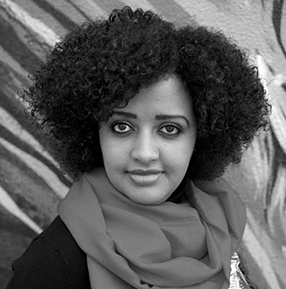Beginnings
This is not how it begins but how you understand it. I walk many kilometers and find myself to be the same— the same moon hovering over the same, bleached sky, and when the officer calls me it is a name I do not recognize, a self I do not recognize. We are asked to kneel, or stand still, depending on which land we embroider our feet with— this one is copious with black blood or so I am told. Someone calls me by the skin I did not know I had and to this I think—language, there must be a language that contains us all that contains all of this. How to disassemble the sorrow of beginnings, how to let go, and not, how to crouch beneath other bodies how to stop breathing, how not to. Our fathers are not elders here; they are long-bearded men shoving taxi cabs and sprawled in small valet parking lots— at their sight, my body dims its light (a desiccated grape) and murmur, Igziabher Yistilign— our pride, raw-purple again. We begin like this: all of us walking in solitude walking a desert earth and unforgiving bodies. We cross lines we dare not speak of; we learn and unlearn things quickly, or intentionally slow (because, that, we can control) and give ourselves new names because these selves must be new to forget the old blue. But, sometimes, we also begin like this: on a cold, cold night memorizing escape routes kissing the foreheads of small children hiding accat in our pockets, a rosary for safekeeping. Or, married off to men thirty years our elders big house, big job, big, striking hands. Or, thinking of the mouths to feed. At times we begin in silence; water making its way into our bodies— rain, or tears, or black and red seas until we are ripe with longing.
Credit
Copyright © 2018 by Mahtem Shiferraw. Originally published in Poem-a-Day on May 16, 2018, by the Academy of American Poets
About this Poem
“It is difficult to contain the plights of the nomads, the immigrants, in a language. It is filled with displacement, disarray, a thick grief. It is lonely. It is humbling. It breaks us, slowly, slowly. But we can talk about it in bits and pieces. And part of being an immigrant is having to start over again, having to begin in a new land, a new life, without forgetting the old one. Having a new identity, a new name, a new self. To begin—without a home, walking in solitude; to begin in silence. This poem is an attempt to give space to that.”
—Mahtem Shiferraw
Date Published
05/16/2018

